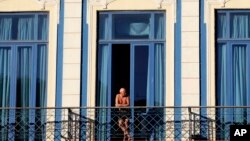The number of U.S. visitors to Cuba has nearly doubled this year, its tourism minister said Wednesday, as the island races to build hotels and expand Havana's airport to keep up with booming demand.
Tourism has taken off since Cuba and the United States announced in December 2014 that they would work to bury the Cold War hatchet. The Caribbean island received a record 3.5 million visitors last year.
The influx has pushed capacity to the limit, prompting hotels to sharply hike prices and raising questions about how Cuba will absorb additional visitors when scheduled U.S. commercial airline service starts later this year.
"With the increase in demand there have occurred problems with the confirmation of reservations and some irritation with delays at the airports, most of all in Havana," Minister Manuel Marrero said at the opening of an annual tourism fair.
Still, overall satisfaction with Cuba as a destination was high, reflected by the fact that nearly half of last year's tourists were return visitors, he said.
The number of visitors so far in 2016 jumped 13.5 percent on the year to 1.5 million, Marrero said. Of those, 94,000 were Americans, a 93 percent jump on the year, and more than 115,000 were Cuban-Americans.
Cuba's tourism infrastructure is creaking, mainly in the capital, where visits were up 37 percent this year, according to the minister. Almost all Americans visit Havana as part of their itineraries, as they are banned from the beach.
Three new hotels
Marrero said three new hotels were under construction around the colonial part of the city, bids were in to renovate some existing establishments, and more were on the drawing board.
He said an airport expansion was planned in Havana but gave no details.
"Until just a little while ago, Cuba was a forbidden destination, and not only for Americans, but for many others from various countries who feared traveling to the island," tourism professor Jose Luis Perello of the University of Havana said.
European tourism in Cuba was up 60 percent through April of this year, said Eric Peyre, who heads up the French hospitality company Accor's operations in the island.
Security threats in other traditional holiday destinations for Europeans, such as the Middle East and Africa, were adding to the Caribbean island's allure, he said.
"Air France has 11 flights a week. Last week, they signed for 28 flights a week from France," he said.
Accor manages three hotels in Cuba, including the 188-room Hotel Seville in Old Havana, once-favorite hangout of Chicago gangster Al Capone, which Peyre said was sold out through the end of the year.
"Last year, a room and breakfast at the Seville cost $120, this year $180, and beginning in November it will cost $280," he said.





